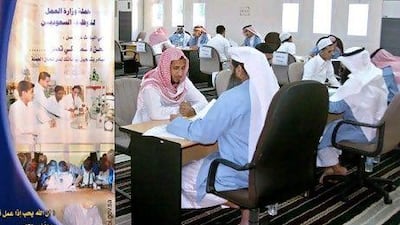Private-sector companies in Saudi Arabia that employ more foreigners than nationals are to be fined from today as part of a government bid to get more Saudis into work.
Companies with a majority of foreigners will have to pay 2,400 Saudi riyals (Dh2,350) per year for each additional foreign worker, said the labour ministry.
Concerns have been raised over the cost to businesses of the initiative, given that about 90 per cent of private-sector workers are estimated to be foreign.
"It's an extra financial cost for us as a company and, more broadly, it could be an issue for foreign direct investment," said Asim Siddiqui, the managing director of AGE Group, a steel manufacturing conglomerate that has three plants in Dammam, in the eastern part of the kingdom.
The company has raised the percentage of Saudi nationals in its workforce to about 20 per cent - in compliance with previous targets set by the government.
But Mr Siddiqui has calculated it will still be liable for penalties equivalent to between Dh80,000 and Dh100,000 under the latest scheme.
Many businesses have traditionally opted to hire foreigners as cheaper alternatives to locals.
As a result, the unemployment rate in the kingdom stands at more than 10 per cent.
After protests flared last year, the Saudi government stepped up its efforts to raise employment.
It introduced a quota system, setting a minimum number of local workers companies must employ based on the size and sector of the business. Companies failing to comply face limits on the number of visas they can receive for foreign staff.
"There's a desire to create more jobs for nationals and to try to do that they are looking at giving more disincentives to hire foreigners," said Giyas Gokkent, the chief economist of National Bank of Abu Dhabi.
But it is unclear whether the latest action will apply to companies employing workers in blue-collar jobs.
Saudis in employment traditionally opt for office-based jobs in the government. Most of the manual jobs are filled by Asian workers.
"Manufacturing will struggle to meet the 50 per cent target," said Mr Siddiqui. "Most Saudis we employ are in administrative, sales and accounts. It will be difficult to fill the more labour-intensive jobs."

